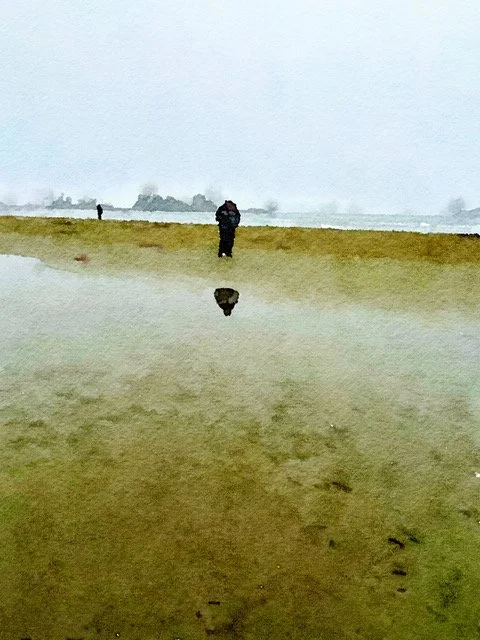“Loss"
Loss is such an unhurried teacher. It doesn’t burst through the door with a neatly outlined curriculum—it creeps in on tip‑toe, rearranging the furniture of our lives while we’re looking the other way. When a beloved partner, dog, horse, or even the half‑finished myth of our future self slips beyond reach, we’re left in a house that suddenly feels both too empty and too full. The air itself grows thick with questions: What do I do now? Who am I if I’m no longer theirs, no longer that, no longer on the path I’d promised myself?
Hand painted photograph by B. Littleton: Chesterman’s Beach. 2023
C. S. Lewis named the first tremor of this moment with disarming honesty: “No one ever told me that grief felt so like fear.” The fluttering stomach, the restless pacing, the instinct to hide—all signs that the ground beneath us has cracked open and we’re peering into a depth we never asked to explore
And here’s the rub: loss isn’t a one‑time elective; it’s a core requirement for being human. John O’Donohue reminds us that when someone or something we love is gone, “Your life becomes strange, the ground beneath you gets fragile.” We wake to the same sunrise, but everything inside us has shifted half a step to the left—slant, unfamiliar, demanding attention.
That strangeness ushers us into what feels like an existential quagmire. We discover there is no tidy syllabus for after: there’s only the ungraded work of sitting with sorrow, of tracing the outline of what (and who) remains. Grief drags our shadowed fears into the light and asks us to decide—again and again—what is worth carrying forward. In Brene‑speak, it’s vulnerability at scale: showing up shattered, sleeves rolled, heart still somehow beating, whispering, I’m here. Let’s try.
Depth psychologist Robert Romanyshyn calls this tender aftermath “the deep wisdom of the soul which recognizes that life is about loss,” a wisdom that lets us cherish ordinary moments even while knowing they are already passing away. His words invite us to treat grief not as a thief but as a curator—selecting, refining, insisting we travel lighter and love truer.
So we take inventory. Integrity? Check it against the stories we tell ourselves at three a.m. Self‑knowledge? Hold it up to a mirror fogged with tears—does it still feel true? Love and joy? Listen for the faint pulse beneath the ache; if we strain, we can hear them chanting keep going. Anne Morrow Lindbergh once wrote, “One cannot collect all the beautiful shells on the beach… one can collect only a few.” Loss is the tide that pries our clenched fists open, leaving us only the shells that matter most.
And yes, loss will be back—utterly dependable in that way. But familiarity doesn’t make it less devastating; it just means we can prepare a little welcome kit: a journal that tolerates angry scribbles, a friend who answers midnight texts, a practice of placing one hand over our own wildly drumming heart and saying, Of course it hurts—look how deeply you love.
When the next wave comes—and it will—we can remember Lewis’s quieter consolation: “The pain now is part of the happiness then; that’s the deal.” Pain and happiness: two sides of the same battered coin we keep in our pocket as proof we were here, we risked the loving, and we’re willing to live awake.
So if you’re standing in the rubble today, friend, know this: you are not broken beyond repair. You are in the sacred, disorienting middle of becoming. Loss may have curated your gallery overnight, but you still get to choose the frame, the lighting, and the plaque that reads, I was brave enough to stay. Keep curating. Keep loving. And when the tide shifts again—as it surely will—may you find, tucked between the ache and the awe, a quiet, unmistakable joy that whispers, Still here. Still yours.
Brenda Littleton
(May 6, 2025)

